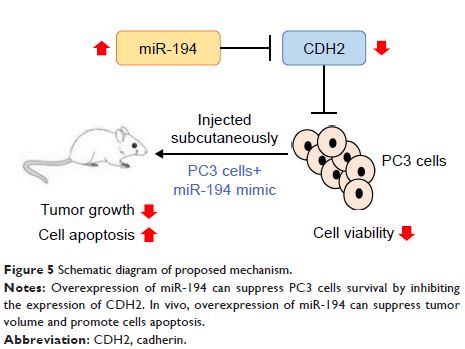108384
论文已发表
注册即可获取德孚的最新动态
IF 收录期刊
- 3.4 Breast Cancer (Dove Med Press)
- 3.2 Clin Epidemiol
- 2.6 Cancer Manag Res
- 2.9 Infect Drug Resist
- 3.7 Clin Interv Aging
- 5.1 Drug Des Dev Ther
- 3.1 Int J Chronic Obstr
- 6.6 Int J Nanomed
- 2.6 Int J Women's Health
- 2.9 Neuropsych Dis Treat
- 2.8 OncoTargets Ther
- 2.0 Patient Prefer Adher
- 2.2 Ther Clin Risk Manag
- 2.5 J Pain Res
- 3.0 Diabet Metab Synd Ob
- 3.2 Psychol Res Behav Ma
- 3.4 Nat Sci Sleep
- 1.8 Pharmgenomics Pers Med
- 2.0 Risk Manag Healthc Policy
- 4.1 J Inflamm Res
- 2.0 Int J Gen Med
- 3.4 J Hepatocell Carcinoma
- 3.0 J Asthma Allergy
- 2.2 Clin Cosmet Investig Dermatol
- 2.4 J Multidiscip Healthc

MicroRNA-194 通过靶向前列腺癌中的 CDH2 来调节细胞活力和细胞凋亡
Authors Gao S, Zhao Z, Wu R, Wu L, Tian X, Zhang Z
Received 23 March 2018
Accepted for publication 26 May 2018
Published 14 August 2018 Volume 2018:11 Pages 4837—4844
DOI https://doi.org/10.2147/OTT.S169101
Checked for plagiarism Yes
Review by Single-blind
Peer reviewers approved by Dr Colin Mak
Peer reviewer comments 4
Editor who approved publication: Dr Samir Farghaly
Introduction: Prostate cancer (PCa) is one of the most common malignancies in men. However, a lack of understanding of the mechanism underlying PCa metastasis has strongly limited the effectiveness of therapy for this disease. Thus, investigating the mechanism of PCa may help improve the prognosis of PCa patients. The goal of this study was to investigate the role of microRNA-194 (miR-194) in PCa.
Materials and methods: The expression of miR-194 and cadherin 2 (CDH2) at the transcriptional level was measured by quantitative real-time polymerase chain reaction (qRT-PCR). The MTT assay cell apoptosis assay and Western blotting were used to determine the role of miR-194 and CDH2 in the PC3 human PCa cell line. The dual luciferase reporter assay system was performed to clarify the relationship between miR-194 and CDH2. qRT-PCR results showed that miR-194 was downregulated and CDH2 was upregulated in PC3 cells.
Results: Transfection with miR-194 mimics decreased cell viability and increased the rate of apoptosis compared with the control group of PC3 cells. Bioinformatics and the luciferase reporter assay indicated that CDH2 was a target of miR-194, and Western blot analysis suggested that CDH2 was negatively regulated by miR-194. Further studies revealed that the downregulation of CDH2 suppressed cell viability and promoted the apoptosis of PC3 cells and that miR-194 directly targeted CDH2 in PC3 cells. Finally, the in vivo experiments showed that miR-194 mimics suppressed tumor growth and induced apoptosis in a greater proportion of cells by decreasing the expression of CDH2 compared with the control group.
Conclusion: The results of this study showed that miR-194 targeted CDH2 to regulate PCa cell survival in vitro and suppress tumor growth in vivo. These findings suggest that miR-194 may be a useful therapeutic target in PCa.
Keywords: prostatic cancer, microRNA-194, CDH2, cell viability, apoptosis
